
How to Learn MongoDB
MongoDB is a document-based database. This means that the data is persisted in a JSON-like document. MongoDB claims this allows for flexibility to change data structure over time. With both cloud and server hosting capabilities, MongoDB could be a great scalable choice for your next project.
There are quite a few companies that develop with MongoDB, so learning how to use this document-based database could prove valuable for your career. In this guide, we will look at resources to learn MongoDB and any skills necessary to start using it. By the end of this article, you’ll have a sense of the best way for you to quickly learn and implement MongoDB in your next project.
What You Need to Know About MongoDB
MongoDB is what is known as a NoSQL database. A NoSQL database structures data in a key-value pair. If this rings a bell is because this is also how a JavaScript object is structured. MongoDB takes this data storage further with its JSON-like document database.
The queries in MongoDB are themselves JSON, so no need to brush up on SQL queries. Here are a few things to learn prior to tackling MongoDB:
- JSON. Be familiar with how JSON structures data.
- Database connection in your language of choice. Know how to connect a database to your project.
- Retrieving data from a database. Be familiar with how your project retrieves data from the database. An example of this is JavaScript fetch().
Skills Needed to Learn MongoDB
Learning the ins and outs of a new database can be challenging. To successfully navigate these challenges, we recommend acquiring these skills prior to taking on MongoDB:
- Language proficiency. You should have the fundamentals of your programming language down to an art.
- Debugging. Know how to read and solve errors. Learning any new concept in programming comes with its fair share of errors.
- Reading docs. Believe it or not, reading documentation is a skill. The MongoDB docs are well written, but an untrained eye may struggle.
Why You Should Learn MongoDB
As more and more data is being stored in the cloud, it stands to reason that learning a cloud-based database can only boost your career. With its lean and flexible document base, MongoDB is an industry leader in NoSQL databases. Here are a few other reasons why learning MongoDB is a good idea:
- It’s always good to learn a new technology. Any professional programmer will tell you that the key to a long career is to be constantly learning. Learning new technologies sharpens existing skills and introduces a new (and sometimes more efficient) skill set.
- SQL is getting old. As SQL ages, we may see a shift to a document-based database ecosystem. MongoDB is an industry leader in NoSQL databases, so proficiency with this tool can improve job prospects.
- MongoDB is lightweight and flexible. With its JSON-like document structure, MongoDB databases are easily parsed by computers. One of the main benefits of this is better app performance.
How Long Does it Take to Learn MongoDB?
When learning a new technology, time is always a factor. As you progress as a developer, learning new things won’t take as long as it used to. In this section, we will consider what it takes to become proficient with MongoDB.
The following time estimates come directly from MongoDB University. MongoDB University is an online tutorial suite from MongoDB. Learning from the company itself is a good way to understand best practices.
The first introductory lesson, MongoDB Basics, clocks in at 8.5 hours. This lesson is divided into chapters that each take about 85 minutes to complete. If you are a fast learner, learning the basics of MongoDB will take a few days. It’s safe to say most developers will be familiar with the basics in about five to seven days.
After the basics module, there are a few options to continue learning. Your next step could be to complete a module on your programming language of choice. A popular one is MongoDB for JavaScript. This module walks the developer through the process of creating a MongoDB database for a Node.js project.
The MongoDB for JavaScript module takes 6.5 hours to complete. This module is divided into 65-minute chapters. Again, this could take a few days to a week to complete. MongoDB University recommends completing the basics module first.
As you can see, it could take you a week or two to understand the basics and be able to start a project with MongoDB. Becoming proficient in a new technology in just a couple of weeks is not bad!
Learning MongoDB: A Study Guide
MongoDB prides itself on developing many internal learning opportunities and boasts a tight-knit community. Below is a list of courses and communities that will help you learn MongoDB.
MongoDB University by MongoDB
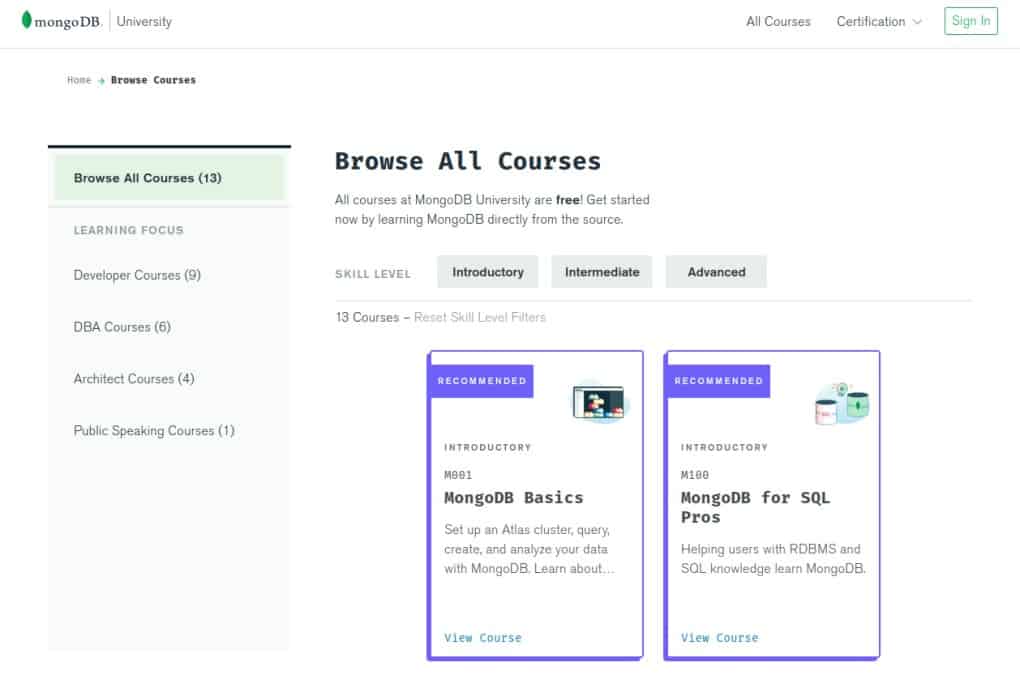
- Resource type: Online courses
- Price: Free
- Audience: Beginner to expert
MongoDB University is a collection of online courses developed by MongoDB. It is the “official” way to learn MongoDB, from the basics all the way to advanced concepts. You can also use this resource to earn MongoDB certifications.
MongoDB Training by MongoDB
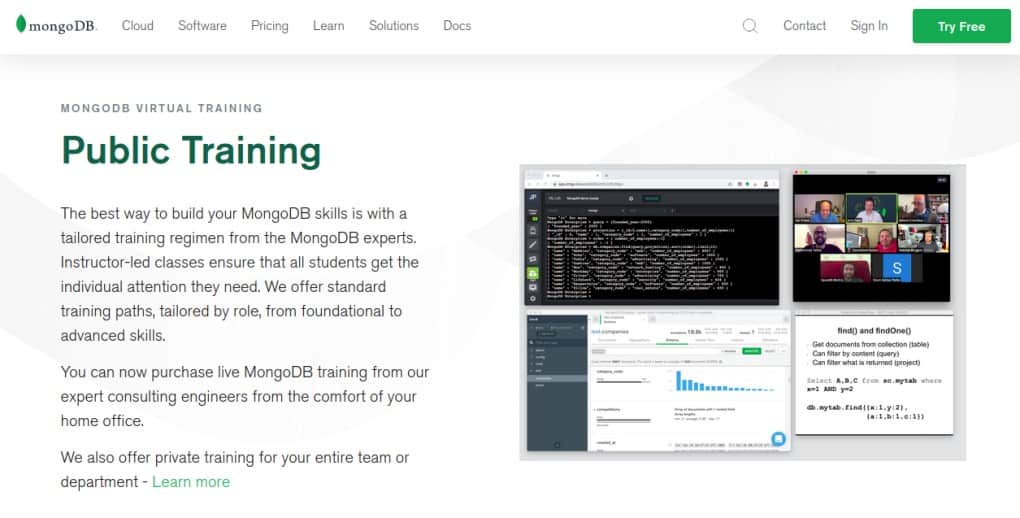
- Resource type: Online or in-person classes
- Price: $3,600
- Audience: Beginner to expert
This is MongoDB’s in-depth training path. MongoDB Training consists of instructor-led classes that can be taken online or in-person. These classes are aimed at teams or individual developers that are passionate about MongoDB.
Learn MongoDB by tutorialspoint
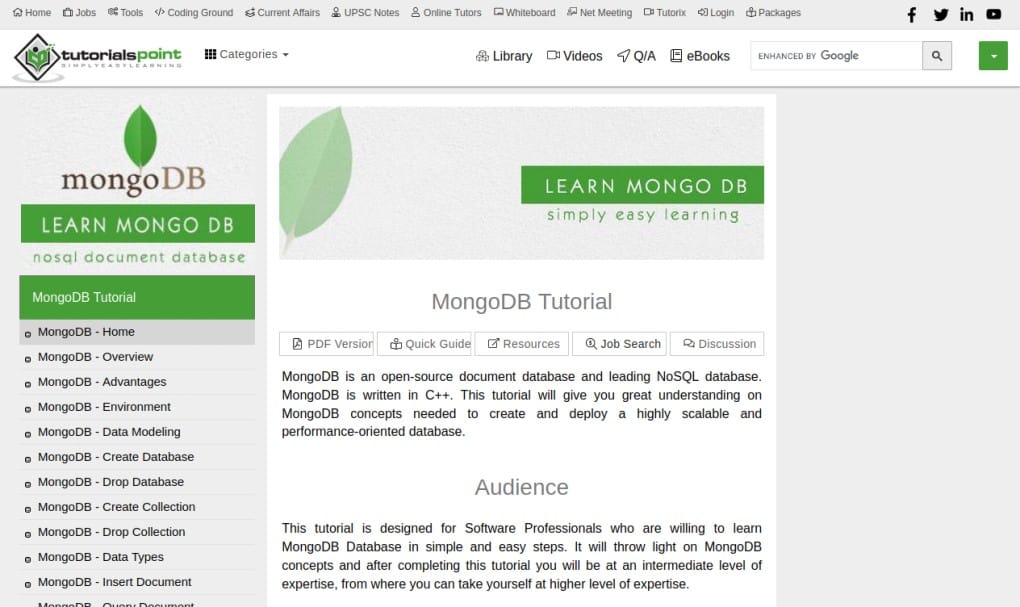
- Resource type: Online tutorial
- Price: Free
- Audience: Beginner and intermediate
The Learn MongoDB tutorial by tutorialspoint is an in-depth guide to becoming an intermediate MongoDB developer. The student will develop a high-performance database, so some preexisting knowledge in the field is helpful. This tutorial is meant for developers that are just starting out with MongoDB but have some programming experience.
MongoDB: The Complete Developer’s Guide 2021 by Maximilian Scharzmuller
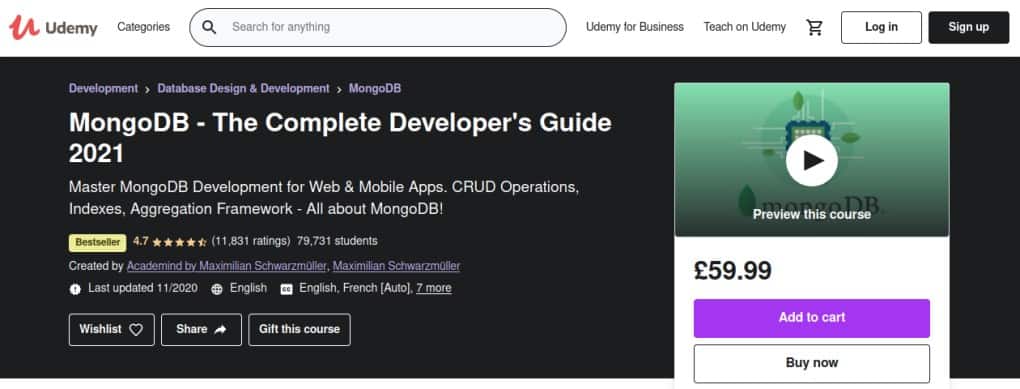
- Resource type: Udemy online course
- Price: $94.99
- Audience: Beginner
In this bestselling course on Udemy, you’ll learn MongoDB, beginning with writing code and queries. The entire course runs about 17 hours long and is quite a price break from the official MongoDB courses. This course targets developers new to NoSQL databases and will guide you through to an intermediate level of expertise.
MongoDB Basics by Skillshare
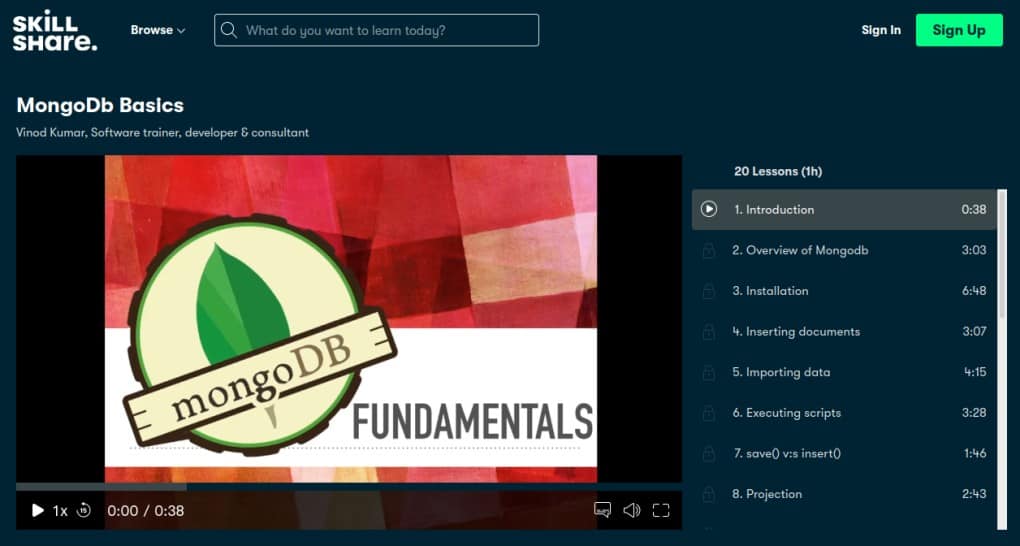
- Resource type: Virtual lecture
- Price: Free
- Audience: Beginner and intermediate
In this online course, instructor Vinod Kumar takes you through the beginning stages of working with MongoDB. This class is meant to be a short introduction, focusing on the fundamentals of a NoSQL database. In just one hour, you’ll have a working knowledge of MongoDB.
Communities for People Studying MongoDB
If you’re studying online, you may feel a bit lonely as you endeavor to further your understanding of new technologies. Online communities are a great place to meet new people, ask questions, and feel supported by others that are passionate about what you’re learning.
MongoDB has a large and passionate community behind it. Below are some communities we recommend you join to get the most out of this database program.
MongoDB Developer Community
This is the official community of MongoDB. It features events, live project demos, and even a weekly live coding session on Twitch. The resources available through the community are meant to support developers at every level.
MongoDB Community Forum
In addition to its large community, MongoDB has its own forum. It boasts a welcoming atmosphere to beginners and a neatly organized thread category list.
MongoDB Subreddit
If you’re familiar with Reddit, you know that a subreddit on any given topic can be a fun and engaging forum. MongoDB’s subreddit features news, articles, and developer questions. This subreddit has been around since 2010 and has many beginner questions.
How Hard Is it to Learn MongoDB?
Learning a new skill takes some time. MongoDB knows this and strives to make the learning process as rewarding as possible. With a large amount and variety of internal resources and communities, MongoDB has everything developers need to successfully implement this program in their next project.
Many of the resources above assume no prior knowledge of MongoDB or NoSQL databases in general. However, prior knowledge of programming language conventions is a must because MongoDB is meant to work with the language you write with. That being said, due to the company’s dedication to providing learning materials, mastering MongoDB is easier than you think.
Will Learning MongoDB Help Me Find a Job?
As more data is stored in the cloud, the number of companies implementing cloud-based databases is growing. With the rising popularity of the MERN (MongoDB, Express, React, Node.js) stack, learning MongoDB could make your resume stand out during your next job search.
There are a few NoSQL databases out there, but MongoDB is the most popular and widely used. Learning MongoDB shows recruiters and hiring managers that you are a developer with an eye on the future.
- Salaries. ZipRecruiter estimates a MongoDB developer can earn from $93,000 up to $185,000 annually.
- Job openings. According to indeed.com, there are thousands of job openings across the United States for developers with MongoDB skills.
- Industry growth. Hailed as the database of the future by thestreet.com, MongoDB seems to be just getting started. As more of the largest companies in tech adopt this database program, it is clear that MongoDB will shape the future of NoSQL database management.
Conclusion: Should I Learn MongoDB?
We have gone over what MongoDB is and how to learn it. We’ve also taken a look at the average salary for a MongoDB developer and what the industry is saying about this tool. If you’re passionate about front end stacks, this database program seems an essential skill to acquire; the industry standard is heading toward incorporating MongoDB.
With the rising popularity of the MERN stack due to its reliability and small footprint, learning MongoDB could become essential for professional growth opportunities. Beginners can easily learn MongoDB thanks to the amount of free internal resources the company provides. Take an intro course at MongoDB University and see if MongoDB is for you.


